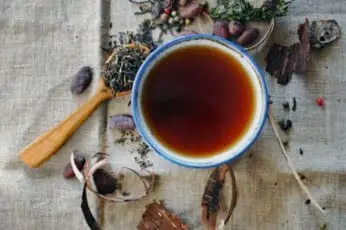Does that daunting sore throat, runny nose, and uneasiness seem all too familiar? Well, we’ve been there and done that – but not anymore! And the answer is tea (it always is, isn’t it?). But what are the best teas for a cold?
Tea is a miraculous beverage that is far beyond looking pretty and smells delicious. Teas and tisanes are a brilliant way to ward off the flu.
When it’s one of those miserable chilly days, you get a feeling those sniffles are sneaking up on you – but not a worry, because you’re curled up in your coziest jumper with a hot cup of tea that’ll take care of everything…just perfect!
Keeping medicinal teas and herbs at the ready in your pantry means you’re more prepared than your body’s immune system.
So we’re here to tell you the best teas for a cold…
Using teas to cure a common cold and flu has been an age-old tradition. It’s been proven to work much as a superfood would.
It isn’t uncommon to hear your doctor say “drink more fluids” when you’re under the weather. But, it’s not always easy to stay on top of your hydration game when you just feel so uneasy.
But with an obvious loss of taste and sore throat, the body invariably finds comfort in hot liquids with simple and subtle flavors.
A great way to stock up and never run out of your favorite teas has to be the convenient bulk tea option.
Having this selection of the right herbal teas and true teas that not only offer a plethora of benefits but also taste delicious make it an effortless option for you!
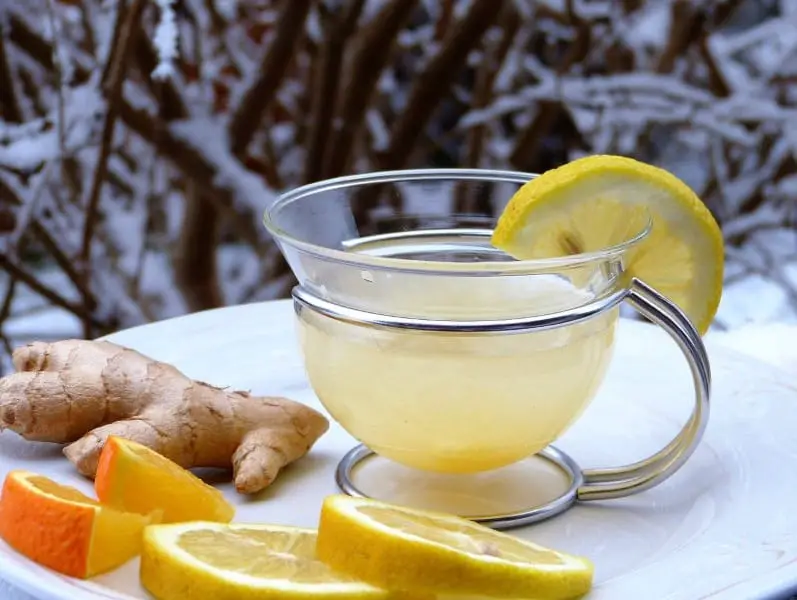
History of teas for a cold
The idea of using herbs and true teas for the common cold isn’t new at all. Long before chemical combinations and drug administration, people went the au naturel way where treating common infections using natural plants and herbs was the only way to go.
Although these concoctions and infusions have been used for several thousand years, they remain, to date, in the front-line for many justifiable reasons.
The common cold or acute upper respiratory tract infections are essentially viral contaminants caused due to human viruses such as rhinovirus, and parainfluenza virus, etc.
Of these, rhinovirus-induced infections are the most common, but are thankfully the least harmful, and most self-restraint too.
Traditional remedies
Reliable Indian, as well as Chinese remedies, have got your back and we can testify that their effects are so fast and effective, you’ll be amazed.
Indian Ayurvedic studies and traditional Chinese medicine theories – among many others – talk in-depth about the benefits of the following best teas for a cold, or naturally occurring herbs that never seem to lose their popularity.
Chinese traditional medicine
Traditional Chinese medicine theories speak of the common cold as “self-limiting”. They talk extensively about cold being an exterior syndrome aggravated by wind or heat and less a result of the virus itself.
According to these theories, we do in fact come in contact with such viruses every day, but, when the body’s immune system is particularly weak, we develop a cold that falls into one of the following broad categories,
- Wind-cold cold
- Wind-heat cold
You probably haven’t heard that before so it may need some further explanation, let’s provide some quick insight…
Although both types are a result of a viral infection coupled with cold weather, these two have distinct symptoms and correctives that separate them easily.
The wind-cold cold is characterized by lighter symptoms, such as a runny nose, body ache, shivers, itchy throat, and sneezing.
What your body really craves and needs at this time are heating herbs and teas that warm your body up.
Consume brews with the appropriate herbs multiple times a day and your good to go.
Wind-heat cold comes with symptoms that make your infection more severe. The stuffed nose, sore throat, dryness of the mouth, and fever undoubtedly accompanied by an irritable behavior makes healing you a family affair.
Chinese medicine highly suggests cooling herbs and tisanes to ease your distress and a suspension of the correct true teas work like magic.
Indian Ayurvedic medicine
Indian Ayurvedic medicine is a recommended, time-honored solution to the common cold and flu.
More often than not, this theory speaks in the context of “instability of body, mind, and soul”. Ayurvedic theories mention an imbalance in “Kapha dosha” when you’re unwell.
Over hundreds of decades, some extremely powerful roots, herbs, and teas have been studied, practiced, and consumed, thus assuring expeditious recovery and good health.
In addition to such ancient practices and theories, the Tibetan, Western medicine has also sustained the test of time, often surpassing synthetic drugs in curing common illnesses.
True teas that add a surfeit of benefits themselves, act as salient palettes to introduce these robust herbs into our body.
Some of the best teas for a cold are the ones we often drink anyway …but when mixed with power-packed herbs and spices, they provide a new level of effect!
So let’s dive into the best teas for a cold…
7 best teas for a cold
The medicinal properties of soothing teas provide a well-rounded, inexpensive cure to keep those aggressive germs away, and calls out to be explored.
From teas that are popular year-long to teas that chaperone you through your tough days, here are our top picks for proven best teas for a cold.
Ginger tea
A humble spice, and now actually one of the most popular teas, Ginger tea has no substitute.
This spice is packed with anti-inflammatory and antioxidant properties that comes into action when the body’s immune system causes damage to its own tissue while fighting foreign microbes.
Bioactive compounds present such as gingerol and shogaols found in this spice also helps with digestion, nausea, and brain functionality. (1)
To treat your cold, you can get really good Ginger tea from here
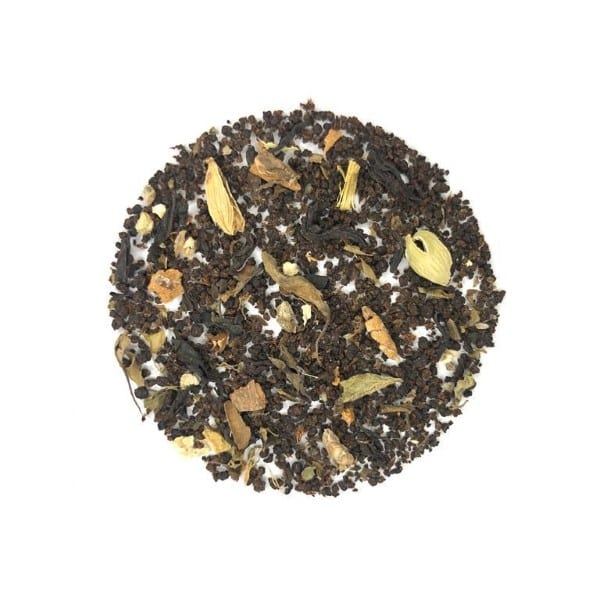
Indian masala chai
the famous Masala chai is a complete treatment in a cup. It’s a favorite among tea connoisseurs and a bigger favorite as an antidote to the flu.
Black tea that’s supplemented with spices such as cinnamon, cardamom, black peppercorns, cloves, and ginger does a great job at clearing your sinuses.
While the small amounts of caffeine in Black tea provide the energy and alertness you need, the antibacterial effects of the spices help with alleviating symptoms. (2)
Here’s the Indian Masala Chai link for you to try.
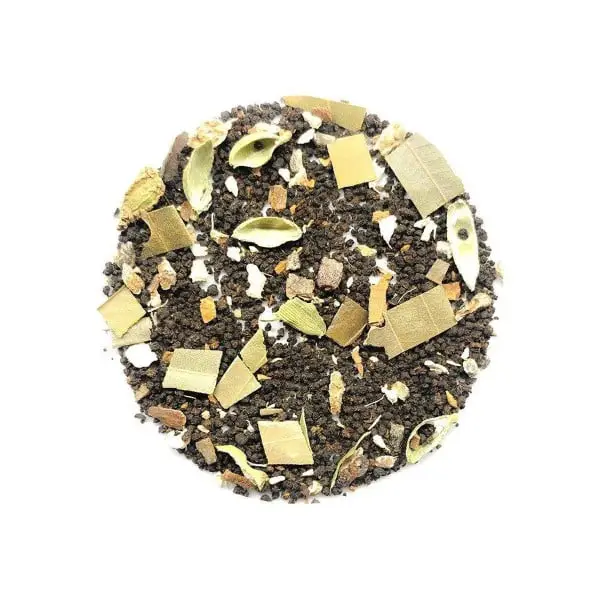
Chamomile tea
The tranquility of Chamomile tea is a no-brainer when it comes to the common cold. A tea absolutely packed with antioxidants and terpenoids such as apigenin, quercetin, luteolin, and patuletin.
Chamomile takes care of combating Reactive Oxygen Species in the body that may otherwise cause damage to immune cells.
Chamomile tea has zero caffeine content, and an abundance of antioxidants. So chamomile tea helps induce sleep and improves sleep quality – something you certainly need when unwell.
We’d be the first to say don’t hesitate before getting your first box but you can also get the best ever tea sampler to get started.
The subtle fruity flavor of Chamomile tea also makes it easy to include other herbs into your cup and can quickly double the potency of your drink. (3) (4)
You can get the Chamomile tea here, or for an added cold remedy punch, or why not try this Chamomile instead!
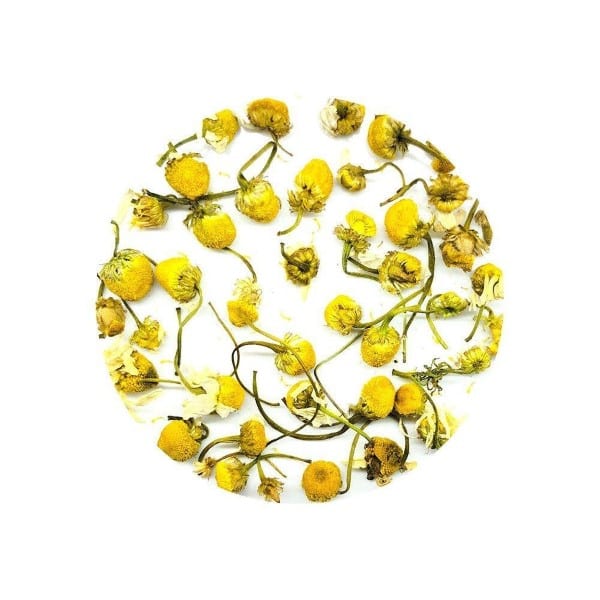
Peppermint tea
One of the most popular herbal infusions – and rightly so, Peppermint is a powerhouse in itself. Ranging from antimicrobial, antiallergenic, antioxidant to antiviral properties, the Peppermint containing flavonoids such as eriocitrin, hesperidin, luteolin covers it all.
Several human studies of this plant show a positive effect on the Gastrointestinal tract and respiratory system. The menthol and menthone in Peppermint help with cooling the body when your symptoms indicate a ‘wind-heat’ type of cold. (5)
It has to be Menthos Green!
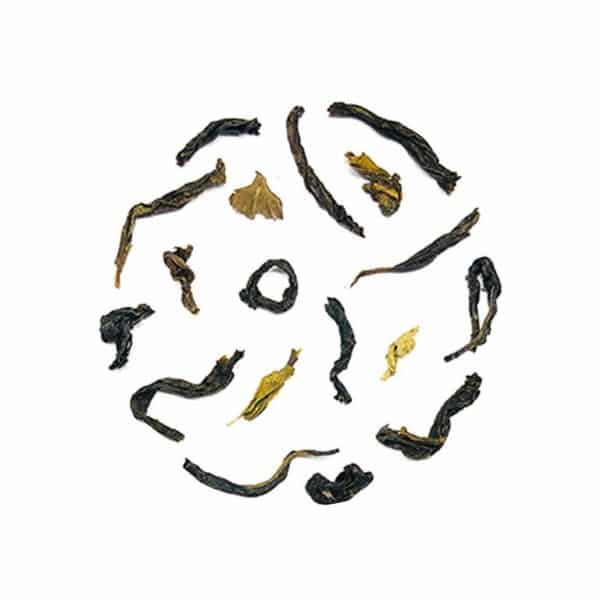
Elderberry tea
A picturesque dark purple fruit, Elderberry tea has gained popularity for versatility when it comes to its instrumental properties.
The polyphenols and vitamins in the Elderberry tea can jumpstart your immune system. In addition to helping with reducing inflammation and increasing the durability of cells, this tea helps reduce stress too.
Alongside the significant properties of the Elderberry tea, it also tastes delicious. Elderberry tea is truly one of the best teas for a cold. (6)
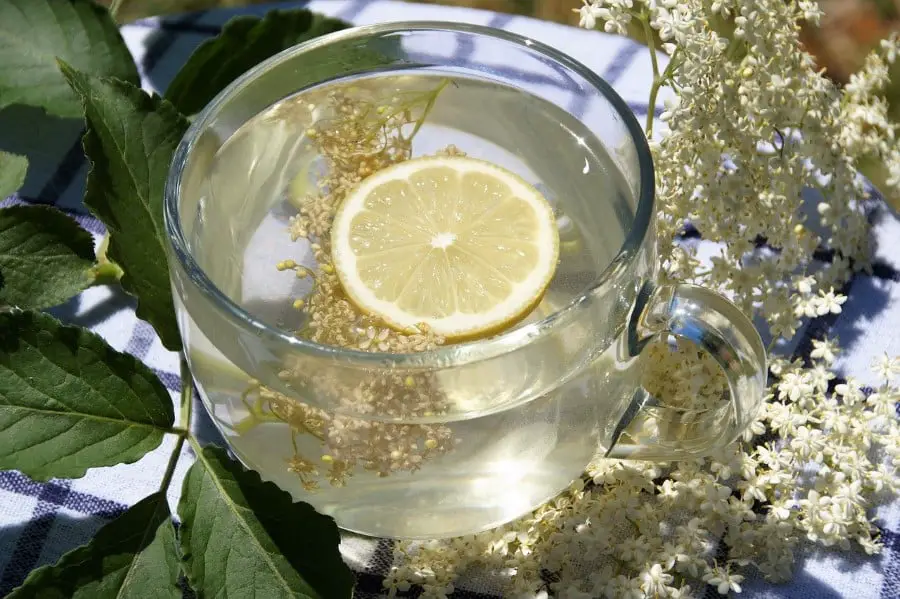
Lemon green tea
The benefits of Green tea are no secret, and with every passing day, this delicate plant gains more accolades.
A tea with lower caffeine content, but uncompromisingly high polyphenols, Green tea is good for you all day every day.
When down with a cold, the body’s immune system gets to work causing high activity in the body.
So free radicals in the body continue to get pumped out and adversely attack immune cells. This is then what causes symptoms to flare up.
Replenishing the body with fluids containing antioxidants and anti-inflammatory compounds becomes crucial and that’s where Green tea comes in.
Lemon in Lemon Green tea adds a ton of vitamin C to the body. (7)
Here’s the lemon green tea you should try!
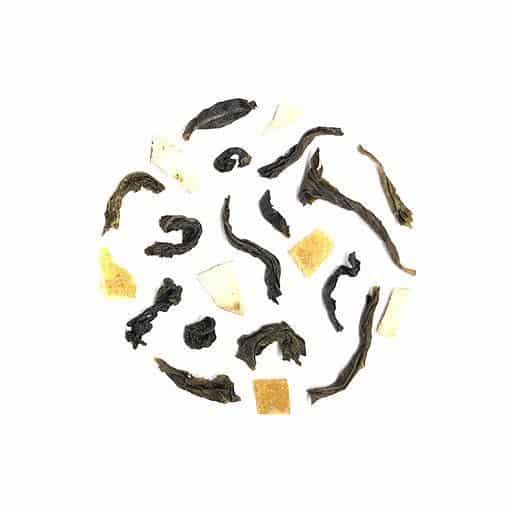
Indian wellness tea (Kadha)
Tulsi or Holy Basil is a gem of India and the vastness of benefits of the Tulsi tea is truly unreal. A versatile little plant of which the leaves can actually be chewed as is,
Tusli boasts wonderful antiseptic and immunomodulatory properties that help with cold and cough. This adaptogen shields the body from toxins and other stress prompting factors.
Kadha is a phenomenal drink produced extensively in India, it’s made from Tulsi tea leaves and other spices. (8)
Quick Indian wellness tea recipe:
- Pour 1.5 cups of water into a saucepan or vessel.
- Add a few pieces of chopped ginger, ¼ teaspoon turmeric powder, 4-5 crushed black peppercorns, and 1 teaspoon of Tulsi tea leaves.
- Cover your saucepan with a lid and bring to a boil for about 15 minutes on a medium flame.
- Strain your concoction.
- Add some honey and lemon to your drink.
- Sip it hot, hot, hot!
Get your Indian Wellness Tea here
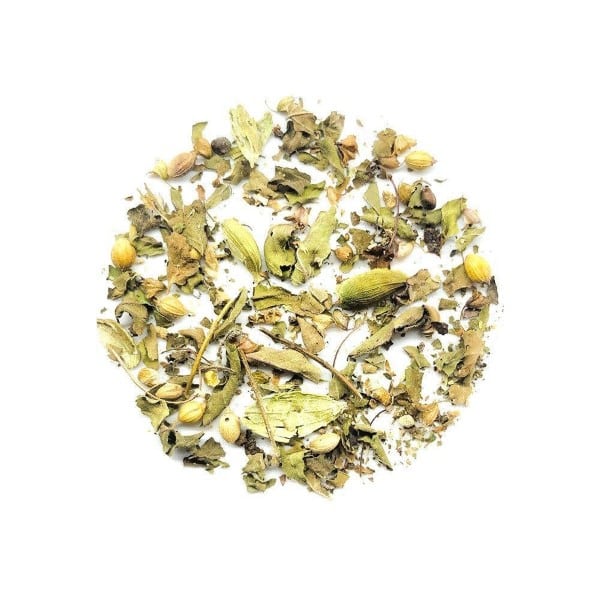
Best teas for a cold – complementary ingredients to try
Improve further on the best teas for a cold, by spicing up your herbal teas with some of these wonderful ingredients. This can make them five times more flavourful and ten times more effective!
Add any of these ingredients to your teas for an enhanced liquor but also because you certainly don’t deserve to live with a cold.
Honey
Honey is an easily available ingredient whose viscosity helps coat the throat thus reducing corrosion of the esophagus.
Also, honey is said to be as effective as Dextromethorphan. An OTC drug often prescribed for the common cold.
Dried orange peel
Not only a delicious, affordable ingredient but also antifungal in nature, dried orange peel helps reduce dampness in the throat and mouth.
Dried/powdered licorice root
Nature’s way of treating indigestion and providing relief from cough, Licorice root also dispels toxicity in the body.
Ashwagandha
An Indian medicinal herb that is increasing its popularity. Ashwagandha has a long list of health benefits. It helps tremendously with improving brain functioning, alertness, and enhancing energy levels.
Dried honeysuckle flower
The vibrant flowers of the shrubs have ample medicinal properties. They are highly regarded in traditional Chinese treatments.
Honeysuckle flowers provide a powerful antiviral activity and have been said to treat Ebola as well.
When and how to make your tea
When you’ve got a cold you need as much help as you can get. So on the subject of the best teas for a cold, there’s no reason to restrict yourself to one or two cups a day.
A standard recommended limit. is between 3-4 cups. So we say you can go ahead and hit those peaks without any concerns.
You can also drink these teas at any time of day. As soon as you feel like you’re coming down with a cold, whip together one of these concoctions and sip on your hot teas throughout the day.
Making these infusions is as simple as it can get. Steep your tea or herbs in a cup of boiling water or alternatively boil water and your ingredients together directly.
Best tea for a cold – How much tea to use
If you’re looking at drinking tea on its own, then use about a teaspoon of loose leaf tea per cup of water.
If you’d like to get a further boost, then add herbs or other spices to your tea for extra punch.
Use as much or as little as you like. But the strength in the flavor, smell and nourishment will spring you back to your normal self in no time at all!
In essence, with these easy, organic remedies, recovering from a common cold becomes so uncomplicated.
When you’re feeling down, kicking back with a lovely book and a hot cup of goodness is a lovely thought.
In a nutshell
You know what they say about combinations – some perfect, some not so perfect. Just like peanut butter and jelly, a campfire with the unavoidable S’mores, or a movie with complimentary popcorn (why isn’t that a thing?). A hot cup of tea when you’re under the weather is as good as Yin and Yang – they just fit!
So you’ve got yourself a list of the best teas for a cold. While most certainly medicines do their own job and shouldn’t always be substituted, these wonderful infusions and herbs boost the power of your prescribed drugs in the most natural, innocuous way there is.
With zero concomitant side effects, there’s little reason not to turn to teas and tisanes for common cold and flu. What these teas offer you will not only dull your symptoms but lift your mood.
So when push comes to shove stock up on your favorites so you’re perfectly prepared!
About the author
Sindhuja Bheesette is an avid tea lover and particularly enjoys the authentic, delicate flavors the beverage offers. Making the switch about 5 years ago from the convenience of teabags, to the premium experience of loose leaf teas, Sindhuja is amazed by the complexity of this modest drink. Having completed her Bachelor in Biology, Sindhuja is interested in understanding how food affects metabolism and overall health in humans.
